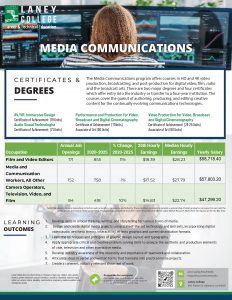Scriptwriting For Video, Broadcast And Digital Cinematography
MEDIA 125 (Class Code 22442)
Tuesdays 1:00-3:50pm in Theater Building Room 426
Instructor: Noemi Zeigler Sanchez
Email: noemizeigler@gmail.com (include your name and class name in the subject line)
Office Hours: Tuesdays 4-5pm in room 426 office
Department website: www.laney.edu/media
SYLLABUS:
Learning Outcomes:
Write for film, television, radio, cable, satellite and webcast.
Review and critique professional and student scripts.
Employ narrative storytelling concepts including character arc and three act structure.
Pitch and write a short narrative film treatment or script.
Materials Needed:
You are responsible to make sure you have access to a functioning computer and printer: Laney College provides printers at both the Library and the Computer Lab (F170) – check their hours and printing policies. Occasionally, you will be assigned readings which require access to the internet.
All homework assignments except for your journal MUST BE TYPED and are due in hardcopy at the beginning of class – EMAILED ASSIGNMENTS WILL NOT BE ACCEPTED. Points are automatically deducted for not typing, not spell-checking and/or not using proper grammar. LATE ASSIGNMENTS are only accepted on a case by case basis and will always result in a point deduction.
If you need writing or ESL support, consider visiting the James Oliver Community Writing Center online or drop in on campus in the B-Building,B260. You may also want to enroll in the course English 208 Writing Workshop.
Required Text: The Screenwriter’s Bible, a Complete Guide to Writing, Formatting and Selling Your Script, David Trottier, Silman-James Press; 6 Exp Upd edition, ISBN-10: 1935247107
Recommended Texts: The Elements of Style, Fourth Edition, Strunk and White, WLC Books, ISBN 1557427283; Story, Robert McKee; Save the Cat, Blake Snyder; On Directing Film, David Mamet; The Writer’s Journey: Mythic Structure for Writers, Christopher Vogler. Read screenplays online at simplyscripts.com and script-o-rama.com.
Projects/Grading:
Your participation in class writing exercises and assignments is a major component of your grade. Additionally, attendance and deadlines are crucial to your professional success.
Attendance/Participation: 30 points
Writing Exercises/Assignments (including possible quizzes): 50 points
Journal: 10 points
Final Project (Verbal Pitch=5 pts; Revised written pitch=5 pts; 5-10 pg screenplay or 2 pg treatment=10 pts): 20 pts
TOTAL POSSIBLE POINTS: 100 points
%100-90=A, %89-80=B, %79-70-C, %69-60=D, 59-0=F
Attendance Policy:
You are expected to show respect to your classmates by arriving on time, being prepared, giving your full attention to your instructor and peers during lectures, discussions and critiques, and staying until the end of class. You earn up to 2 points for each class period for attending and participating constructively in discussions, critiques and group writing exercises. If you show up late or leave early, you will earn at most 1 point for that day.
Participation:
Your participation in class activities and a professional attitude comprise a large part of your grade. Team work, respect for others, the ability to communicate, the ability to maturely receive and provide constructive criticism to your peers are crucial to your professional success.
• Disruptive behavior or poor attitude=zero participation points for the day; you may be asked to leave or given a different assignment.
• Repetitive disruptions=You must meet with instructor privately before a return to class is allowed.
• Assignments not turned in when due=you won’t receive detailed feedback but you may earn partial credit for turning in late, per instructor’s approval on a case by case basis.
The weekly schedule is always subject to change. If absent, it is your responsibility to call another student to find out what you missed — being absent is not an excuse for not being prepared. Do not ask instructor to catch you up in the middle of class if you have arrived late.
Projects and in-class assignments cannot be made-up. Absences are excused on the following grounds only: illness, injury or other medical necessity accompanied by a doctor’s note. Four tardies or early departures from class may drop the final grade by one step (B to C, C to D…) Four (4) unexcused or consecutive absences may result in a final grade of F or being dropped from the class.
Writing Lab rules:
• We agree to give each other honest but constructive (never destructive feedback).
• We agree to treat each other and each other’s efforts with respect. It is essential that we work to earn each other’s trust and to create an environment where all students feel safe to experiment, have fun, and share their ideas.
• We won’t disturb the class in the middle of lecture, workshop or critique by entering or exiting the room (unless completely necessary), talking, eating, laughing inappropriately, or answering cell phones. ALL CELL PHONES MUST BE TURNED OFF DURING CLASS OR YOU WILL AUTOMATICALLY RECEIVE A ZERO PARTICIPATION FOR THE DAY AND MAY BE ASKED TO LEAVE.
Plagiarism:
Plagiarism will result in a zero for an assignment and possible expulsion from the class.
Plagiarism may consist of using the ideas, sentences, paragraphs, or the whole text of another without appropriate acknowledgement, but it also includes employing or allowing another person to write or substantially alter work that a student submits as his/her own. It is never acceptable to copy and paste any part of an assignment from Wikipedia or from any other source that is not your own.
Americans with Disabilities Act:
The instructor wishes to make this course as accessible as possible to students with disabilities that may affect any aspect of course assignments or participation. Please communicate by the second week of the course about any accommodations that will improve your experience in (or access to) this course. You can also contact the Disability Services and Programs for Students at 510-464-3428 for assistance.
COURSE OUTLINE
Week 1 1/26/16 Introductions. HW: Read textbook pages 1-49 by week 3.
Week 2 2/2/16 Goals, needs, conflict. Set up, twist, resolution. HW: 20 page journals assigned. (must be handwritten and include the “magic word” we agree on in class somewhere on each page)
2/7/16 Last day to drop without a “W” and receive a refund; Last day to add.
Week 3 2/9/16 Narrative three act structure. Screenplay formatting. Loglines. HW: Read textbook pgs 50-95
Week 4 2/16/16 Plot, genre. Themes and messages.
Week 5 2/23/16 20 page Journal Due. Hero’s Journey.
Week 6 3/1/16 Character Arc. HW: Script analysis assigned – due week 9.
Week 7 3/8/16 Plants and Payoffs. Subtext. HW: Read textbook pgs 99-126.
Week 8 3/15/16 Short formats: Commercials, Vine, Web and TV shows.
Week 9 3/17/16 Script analysis Due.
3/22/16 NO CLASS – SPRING BREAK!
Week 10 3/29/16 Breaking into the business – pitching. HW: Final project pitch (written and verbal) assigned – rough draft due week 11
Week 11 4/5/16 Present one minute verbal pitch to class for feedback; turn in written pitch rough draft. HW: Read textbook pgs 129-215.
Week 12 4/12/16 More on screenplay formatting – review pgs 354-362.HW: Written pitch rewrite due next week.
Week 13 4/19/16 Turn in rewrite of pitch. Final project beat sheet assigned – due week 14.
Week 14 4/26/16 Turn in and workshop beat sheet – BRING 2 COPIES.HW: Read pgs 281-410. Prepare for quiz on terminology from lectures and textbook next week.
Week 15 5/3/16 Quiz on terminology from lectures and textbook. Final project treatment or screenplay assigned.
Week 16 5/10/16 Workshop final project treatment or script draft — BRING ENOUGH COPIES FOR A TABLE READ. Breaking into the business. Reality, TV, Film, agents, spec scripts.
Week 17 5/17/16 FINAL PROJECTS DUE – 1) present a verbal pitch, 2) turn in final revision of written pitch, AND 3) turn in 2 page treatment or5-10 page script.
Week 18 5/24/16 Final exam week – Possible final exam TBD. Celebrate!








